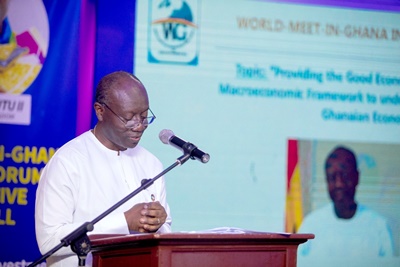- International financing programme won’t exceed US$1bn
- Reduction in domestic debt financing
The government has signalled a commitment to reducing the country’s debt levels through its revenue-enhancing and expenditure rationalisation measures in 2022.
The country still relies heavily on debt financing to meet a significant portion of its expenditures; given that on the expenditure side, for instance, cumulatively, interest payments and compensation payments alone absorb all the total revenue and grants for January to September 2021.
Presenting the 2022 budget statement and economic policy of government in Parliament, the Finance Minister, Ken Ofori-Atta said, the approval and implementation of the revenue-enhancing and expenditure rationalisation measures will lead to significant fiscal adjustment from a projected fiscal deficit of 12.1% of gross domestic product (GDP) in 2021, which includes energy Independent Power Project (IPP) payments and financial sector clean-up cost to 7.4% in 2022.
This represents an adjustment of 4.7 percentage points in just one year, he added. “Not only are we significantly bringing the fiscal deficit down, but we are also posting a primary surplus of 0.1% of GDP in 2022 from a negative primary balance of 4.7% in 2021.
These measures will no doubt slow down debt accumulation and will put the debt to GDP ratio on a declining path. We expect this new paradigm shift to create the needed fiscal space to continue to support broad-based inclusive growth.”
He added: “key focus of the budget fiscal consolidation to enhance debt and fiscal sustainability as we implement our economic revitalisation and transformation programme post-Covid-19 to save more lives from the Covid-19 pandemic and better the lives of Ghanaians.”
Based on governments own estimates for total revenue & grants and total expenditure, the 2022 fiscal operations will result in an overall fiscal deficit of GH¢37.0 billion, equivalent to 7.4% of GDP, which represents a nominal year-on-year reduction of about 30.7% over the projected outturn of 12.1% of GDP in 2021.
Deficit Financing
In 2022, the government intends to finance its deficits through the usual foreign and domestic sources, as well as some exceptional financing.
Total foreign financing of the deficit as well as exceptional financing, namely the IMF’s Special Drawing Rights (SDR) will amount to GH¢9.1 billion, equivalent to 1.8% of GDP. This as well includes a planned international financing programme not expected to exceed US$1billion to raise up to US$750 million for liability management and budget support, particularly, capital expenditure.
This is a sharp decline from the 2021 international financing programme target of US$5billion, of which only US$3billion was raised.
On the other hand, financing of the deficit from domestic sources, including net issuances from debt will amount to GH¢27.9 billion, equivalent to 5.6% of GDP. The additional exceptional financing from the utilisation of the newly allocated SDRs by the IMF is expected to augment and reduce domestic borrowing needs in 2022.










